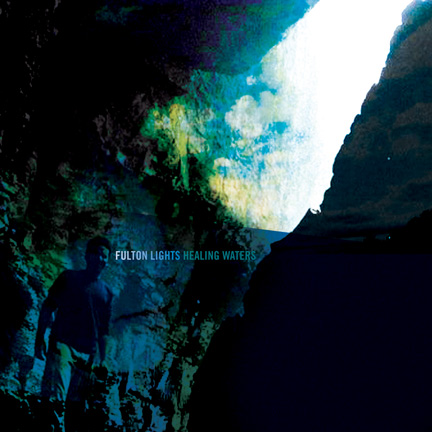
Fulton Lights
Healing Waters EP
(Catbird Records; 2009)
By Conrad Amenta | 15 September 2009
Heading further down paths he discovered on his 2008 LP The Way We Ride, Andrew Goldman continues to distance himself from the micro paranoia that seemed like such a defining gesture on his self-titled debut. By contrast, Healing Waters is downright Springsteen-ian in the cloak of its grandeur. Its opening statement is colossally anthemic, uncritically hopeful and finds its titular salvation in the same places where Goldman once seemed deeply suspicious of the clandestine operations of urban unknowables. Even the cover of the EP seems to imply a sort of yielding to transcendentalism.
Goldman still scrapes at the confines of what are fundamentally rock songs with noise that tremors enormous, but on first listen seems much more comfortable with our messy modern world than he once was. While it’s true “Monsters We’ve Built” sounds as condemnatory as it is does a mammoth arena rock song, Healing Waters as a whole wants to be broadly thematic in a way that evokes music history in fact rather than post-modern disassemblage. It’s a real shift, certainly from Fulton Lights (2007) and even from The Way We Ride, in that even when its subject matter turns poisonous it still seems steadily unquestioning of its aesthetic premise—a sort of genuineness much maligned in today’s irony-heavy derision of traditional music. “Bleeding Myself” evokes equal parts swish-and-sway and railway chug from the echo chamber of its rustic martyrdom—what is essentially the country canon writ appropriately large. The man can’t give the woman what she needs, finds a woman who can be satisfied with his flawed state, and in breaking from the former in favor of the latter ascends a cross of his own making to place on exposition his failure as a man. Add Johnny Cash to Bruce Springsteen and we’re only three songs in.
Most vital here is “Things Done Changed,” an ironic lament for the patriotism of a former America. “Man I tell you / Things done changed / Since the days of flags hanging from the windows / and the ticker-tape parades […] from the days of black and white / From the days when you could tell the difference between wrong and right.” Critics were forced to mewl during the ascendancy of Bush Jr., to insist against the crescendo of patriotism that to be a critic was in itself patriotic, which is why it’s so valuable to have songs like “Things Done Changed” now that we are treated to the semi-utopian mores to which those same critics now resort. The song purposefully induces a real, anachronistic romance assigned to its selective memory, to days of the trenchant and marginalized artist in crass, war-fevered America, and thus forces the following unhappy thought: for as bad as things were in the early 2000s, their badness made it easier to be an artist. Those days are gone. “And I know we’re not quite as photogenic as we used to be / Lord knows I’m not the kid I was when I was twenty-three […] I kneel down and kiss the line in the middle of the road.” Add to the mix a beauteous cover of David Byrne’s “Glass, Concrete & Stone,” which intones typical Byrne-like alienation with the urban world and the hope that “my body and soul be my guide.” Fulton Light’s music has always seemed to react to complex events—first with paranoid disbelief, then nigh-nihilistic acquiescence—and now, with Healing Waters, a simple, romantic disavowal in favor of something simpler. Goldman concludes the EP saying, “There is nothing in the world that belongs to me.” It becomes apparent that this isn’t Goldman’s The Rising (2002) after all, but a knowing invocation of that music in a way that is, in fact, healing.
Healing Waters feels almost as if Goldman is dusting his hands of the messy confluence of our modern events, which may be why its been relegated to the pseudo-caveat of EP status rather than part of the larger statement implied by full-length exploration. Linger too long in this fantasy and one is divorced from the world, hardly the ideal position for an artist that craves relevance. But beneath the red herring of the EP’s aesthetic qualities are the formulations of a respectable discographic formula. Goldman is building quite the self-aware catalogue.





